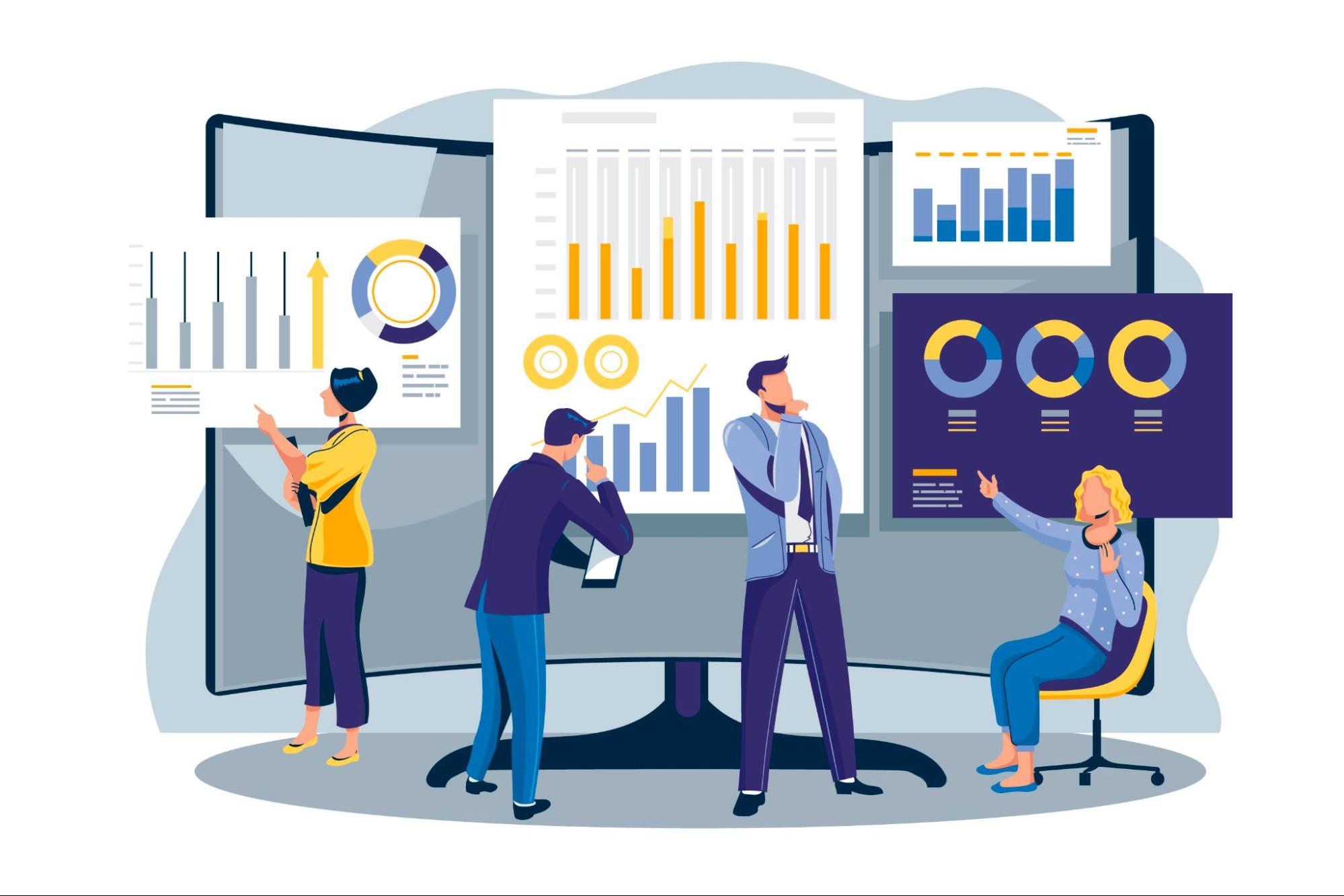Businesses are inundated with information from every direction in this data-driven world. The challenge isn’t only about gathering data—it's making sense of it and using it effectively. This is where Business Intelligence (BI) platforms come into play. They are designed to turn overwhelming data into actionable insights, providing companies with the tools they need to gain a competitive edge and make informed decisions. Let’s begin with the basic question what is business intelligence?
What Is Business Intelligence?
Business Intelligence (BI) refers to the technologies, strategies, and practices that organizations use to collect, analyze, and present data. BI platforms are at the heart of this process, serving as a comprehensive solution to manage and understand data. Their main goal is to convert raw data into meaningful insights that drive smarter business decisions.
Historically, the concept of business intelligence dates back to the 19th century when Richard Millar Devens first coined the term in his book Cyclopædia of Commercial and Business Anecdotes. He illustrated how bankers could gain an advantage by using information before their competitors. Fast forward to today, and businesses are dealing with far more data than those early bankers ever imagined.
In 2016, the International Data Group (IDG) found that the average company managed a staggering 162.9 terabytes of data. Meanwhile, Forrester discovered that between 60% and 73% of this data remains untapped for analytics. This highlights a significant problem: despite having vast amounts of data, many companies struggle to use it effectively.
Business Intelligence platforms address this issue by making data accessible and actionable. They help businesses:
- Enhance Product Development: Understand customer behavior to refine products and better meet market needs.
- Improve Customer Service: Learn more about customers' needs and preferences to provide superior service.
- Optimize Operations: Detect potential issues early, leading to more efficient business operations.
A robust Business Intelligence (BI) platform can set your business apart. The right BI tools enable you to make data-driven decisions quickly, giving you a competitive advantage that’s hard to beat. This advantage stems from having timely, precise insights derived from your own data rather than relying on external sources.
Key Functions of Business Intelligence Platforms

The top-notch Business Intelligence platforms should streamline the processes of collecting, interpreting, and visualizing data. The ultimate goal is to foster a data-driven culture where every team member can leverage insights to drive decisions. Here’s what a BI platform should excel in:
Data Collection
Businesses typically draw from an average of 400 different data sources. A BI platform’s first job is to consolidate data from these varied sources into a unified system. When assessing BI platforms, ensure they offer the following capabilities:
- Data Integration: The platform should seamlessly integrate data from diverse sources such as databases, data warehouses, and CSV files.
- Data Cleaning and Quality Management: Good BI platforms excel in managing and improving data quality. They should efficiently clean and standardize data, making disparate data sets useful and coherent.
- Data Blending: After cleaning, the platform should allow for the blending of data into a comprehensive view. This means combining information from multiple sources to create a complete dataset.
- Compliance and Security: It is crucial to ensure that data is managed securely and in compliance with regulations. Your BI platform should facilitate this with robust security features.
Data Understanding
With data aggregated into a single platform, the next step is to make sense of it. A BI platform should enable you to analyze, organize, and query your data effectively:
- Data Modeling and Organization: The platform should provide tools to model and organize data in ways that align with your business needs. For instance, custom data stores can be used to meet specific requirements of different teams, like marketing.
- Data Querying: Users should be able to query data to retrieve necessary information quickly and easily.
- Exploratory Data Analysis (EDA): The platform should support advanced analytics for deeper insights. Features like drill-downs, data pipeline controls, and customized data stores help analysts explore and test hypotheses in depth.
Visualize data
It’s not enough for your data to be understandable — it has to be usable. BI platforms should make it easy to collaborate and act on the insights your team identifies after you gather and understand it.
When evaluating BI platforms, look for the ability to do the following:
Share your findings with dynamic dashboards. After modeling, cleaning, and querying your data, BI platforms should make it easy to create custom, dynamic dashboards to visualize what’s happening with your data in real-time. Bonus points if you can manipulate and interact with these dashboards without coding knowledge.
- Collaborate and communicate: Many people across your organization will use your BI platform, so the ability to collaborate and comment within the platform and even within dashboards is vitally important. Setting up custom alerts will also keep leaders, teams, and even the entire company informed of important developments. Here’s how that might work when analyzing sign-ups for your service:
- Work with other technology: BI platforms are just one, albeit important, part of your tech stack, which means they need to work well with all of the other tools you use. That includes where it gets data from (as we covered earlier) and where you send your dashboards.
The Impact of a Business Intelligence Platform: Democratizing Data

The ultimate goal of implementing a Business Intelligence (BI) platform is to cultivate a culture of data democracy within your organization. This means empowering every employee with the ability to access and utilize data whenever needed, leading to faster and more informed decision-making.
Traditionally, managing data—from its collection and analysis to its visualization—has been a task relegated to overburdened data and IT teams. However, modern BI platforms simplify and often automate these processes, freeing up these teams to focus on more strategic activities, such as in-depth analysis and actionable insights.
One significant advantage of streamlined data management is that it lowers the technical barriers to accessing and interpreting data. This democratization of data means that all employees, from top executives to marketing specialists and new sales recruits, can leverage data to make informed decisions and collaborate effectively.
By providing easy access to data and simplifying its use, a BI platform can turn democratized data into a powerful competitive edge. This approach not only enhances the efficiency of your team’s collaboration but also elevates the overall quality of decision-making across your organization.
Evolution of Business Intelligence Platforms

Over the past two decades, business intelligence (BI) platforms have undergone significant transformation. Two major advancements stand out in this evolution:
Cloud-Based Business Intelligence
Previously, business intelligence systems were installed on physical servers within a company’s infrastructure. Today, many BI platforms have transitioned to cloud-based solutions, accessible via web browsers. This shift means you can now access your BI tools from anywhere with an internet connection—whether you're at the office or on the go.
The move to cloud-based BI platforms also brought about a subscription-based pricing model, similar to other Software as a Service (SaaS) offerings. Instead of a hefty upfront cost, businesses now pay a more manageable monthly or annual fee. This evolution has lowered the entry barrier for companies of all sizes, including startups that previously could not afford a dedicated BI system. You no longer need to invest in expensive hardware or build an in-house team to manage it. Instead, you can start with a simple subscription and even explore options through free trials.
Self-Service Business Intelligence
With the democratization of data comes the need for user-friendly tools that anyone can navigate. As more people begin to use BI platforms, the demand for self-service capabilities has increased. According to BI Survey, self-service is one of the top trends in BI, alongside other important aspects like data preparation by business users. Self-service BI platforms are designed to be intuitive and accessible, allowing users without technical expertise to leverage powerful data insights.
This shift enables businesses to be more agile with their BI systems, adapting quickly to changes in the marketplace and evolving business needs. Self-service BI empowers all employees to engage with data, fostering a more dynamic and responsive data culture.
Why You Should Consider Business Intelligence Software?
Exploring business intelligence (BI) software has never been easier. Today, the benefits of BI are within reach for businesses of all sizes, from dynamic startups to established Fortune 500 companies.
With the advent of self-service technology, modern BI software is designed to be user-friendly, allowing anyone to leverage its capabilities. This ease of use means that there’s little reason not to explore BI solutions. The advantages of using BI software can be both immediate and enduring, fostering a data-driven culture that enhances sales, boosts operational efficiency, and refines overall decision-making.
To help you make an informed choice, we’ve compiled a list of prominent business intelligence software, highlighting their strengths, weaknesses, and the types of businesses they best serve. If you're curious about how BI software can benefit your organization, we encourage you to try out a free trial and experience the transformative impact firsthand.




